Originally posted on January 15, 2012. Updated on February 18, 2012.
Remember the $540,000 of nasty political ads expended by “Super PACs” in City Council elections last year? The Committee For Oklahoma City Momentum spent about $415,000 and Voice For Responsible Government spent $125,000.
Corporate Greed 1870s-19teens Oklahoma City
Mays Camp Oklahoma Legal Stuff
Introduction. That outrageous blot on Oklahoma City democracy was made possible by the United States Supreme Court ruling in Citizens United v. The Federal Election Commission which was decided on January 21, 2010. In that 5-4 decision, the majority held that corporations are “people” and are therefore entitled to the 1st Amendment protection of free speech, and the upshot has been that corporations can make unlimited contributions into Super PACs without ever once saying who they are.
Some might call Super PACs “educational” but I’ll call them big big money trying to buy our votes. I call them a threat to democracy.
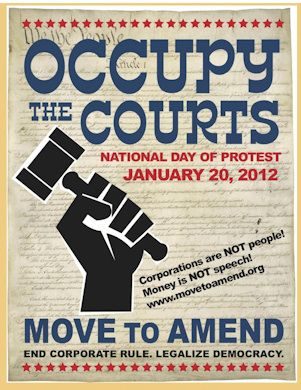 Various movements have sprung up around the country to attempt to undo the Citizens United decision, one being MoveToAmend.org, it advocating an amendment to the federal Constitution which, at its core, would declare that corporations are NOT people and effectively overturn the Citizens United decision.
Various movements have sprung up around the country to attempt to undo the Citizens United decision, one being MoveToAmend.org, it advocating an amendment to the federal Constitution which, at its core, would declare that corporations are NOT people and effectively overturn the Citizens United decision.
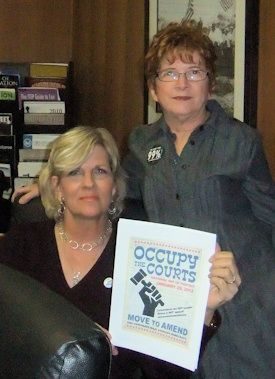 Taking a cue from “Occupy Wall Street,” “Occupy The Courts” rallies are planned around the country this Friday, January 20, 2012. In Oklahoma City, the rally is spearheaded by these ladies, Susan McCann (left) and Rena Guay (right), and I’ll get back to writing about their activities shortly.
Taking a cue from “Occupy Wall Street,” “Occupy The Courts” rallies are planned around the country this Friday, January 20, 2012. In Oklahoma City, the rally is spearheaded by these ladies, Susan McCann (left) and Rena Guay (right), and I’ll get back to writing about their activities shortly.
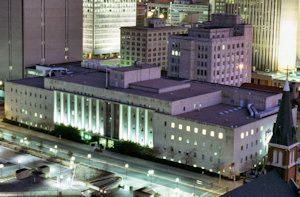 The Oklahoma City rally will be in front of the Federal Courthouse, 200 NW 4th, between 12 noon until 1 pm.
The Oklahoma City rally will be in front of the Federal Courthouse, 200 NW 4th, between 12 noon until 1 pm.
I’ll have more to say about the Citizens United decision and rallies around the country shortly.
The Silly/Funny Background. However, before I get serious, it is an indeed ironic coincidence (?) that yesterday, January 15, the Super Pac Americans for a Better Tomorrow, Tomorrow launched a juicilloushly (if that’s not a word, it should be) sarcastic ad in the South Carolina Republican primary — the Super PAC was formed by Comedy Central’s Stephen Colbert and is also known as “The Definitely Not Coordinating With Stephen Colbert Super PAC” — Colbert transferred control of the PAC to Jon Stewart of “The Daily Show” last week so he could form an exploratory committee to consider a run for “President of the United States of South Carolina.” Since that initial TV ad, Comedy Central has done more, and I’ll show a pair of their videos here.
This 1st video is simply too good not to watch … over and over again! The narration is by John Lithgow …
The above was followed by the January 17 production, “Colbert Super PAC – Not Coordinating with Stephen Colbert,” on Jon Stewart’s Daily Show:
This ongoing political satire at Comedy Central has captured the nation’s print, television, and internet media fancy. Here are excerpts from an opinion piece by Linda P. Campbell on January 19 in the Ft. Worth Star Telegram:
| Commentary: Will Colbert Nation make its point about super PACs in S.C. primary?
What’s more likely to call attention to the outrage that is the super PAC: a bunch of Occupiers showing up at federal courthouses Friday — or Colbert Nation upending Saturday’s South Carolina Republican primary by voting for Herman Cain? |
The Serious Background. Both before and after the Citizens United decision, a number of items are present to consider. “Who is a person?” “When does a person come to exist?” “How — does it matter how a person was conceived — in other words, can a person be conceived in one or more ways than the ordinary human reproductive means to do so?”
Early National Background. Although not mentioned in the United States Constitution, corporations have been around since before the American Revolution, they picking up steam in England during the Industrial Revolution. In the States, the so-called Second Industrial Revolution gained momentum with the steam engine and transcontinental railroads, among many other good things, and the corporations served such interests. But, at the time, and to use a term that would probably be called “collateral damage” today, many were harmed by the virtually unrestrained corporate capitalism which flourished during the 19th and the early part of the 20th centuries.
 Put differently, are the rights of a person different if they are human or if they are a person formed by the law of a state or the United States?” I mean, we are seriously having to look at Star Trek’s fictional Borg when considering this topic, aren’t we? If you disagree, please explain in a comment.
Put differently, are the rights of a person different if they are human or if they are a person formed by the law of a state or the United States?” I mean, we are seriously having to look at Star Trek’s fictional Borg when considering this topic, aren’t we? If you disagree, please explain in a comment.
In our civics and history classes in secondary school we learned about the Standard Oil monopoly and we learned about Boss Tweed and other political corruption which was influenced by unbridled corporate greed during that time — well, to qualify that statement, at age 69 I really have no clue what is taught in secondary schools in Oklahoma or elsewhere these days — heck, I don’t really know if American history is even taught in schools any more although I hope that it is a required subject.
Standard Oil Monopoly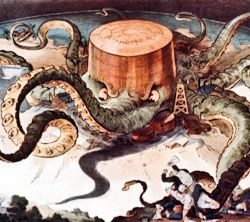 |
Boss Tweed, 1871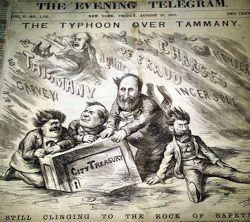 |
The above newspaper editorial cartoons reflect the time of the late 1800s. Not to mention the working conditions of adult laborers which were often life-threatening and horrible at best, many corporations hired child labor in their workforce — which is precisely why child labor laws began to develop in the 20th century. Corporations were the reason that child labor laws came to exist in the first place — such laws did not merely pop into place for no reason.
1900s Coal Miner Children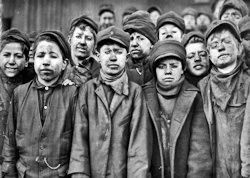 |
1912 Child Labor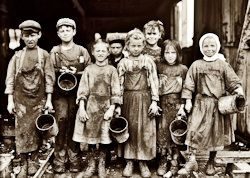 |
| 5 Year Old Hymie Miller Selling Newspapers in Oklahoma City 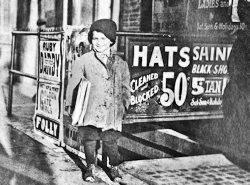 |
5 Year Old Ernest Chester Selling Newspapers in Oklahoma City 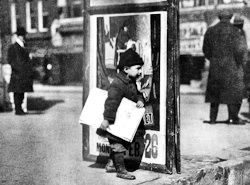 |
The above pair of images are credited to Larry Johnson, Historic Photos of Oklahoma City (Turner Publishing Co. 2007). In the text, Johnson notes, “In 1917, the National Child Labor Committee investigated conditions of child workers in Oklahoma. Noted Photographer Lewis W. Hine documented the committee’s work.” The kids were called, “newsies,” Johnson says, and in another picture not shown here of a 9 year old child selling papers downtown, the child was quoted as admitting to his truancy saying, “I dunno where the school is.”
Oklahoma City. National economic calamity can be another byproduct of unrestrained poorly regulated corporate capitalism. The Wall Street Crash of October 1929 marked the beginning of the 10-year long Great Depression. In Oklahoma City, though, downtown construction continued full-steam into 1930 with the construction of the 1st National Building and Ramsey Tower (City Place today), as well as the YWCA on NW 1st (Park Avenue) and many others, and some opined that Oklahoma would not necessarily be hit by the Wall Street Crash as hard as some places. By 1931-32, it became evident that any such hope was merely wishful thinking.
During the 1930s, Oklahoma City came to have some of the most populated “Hoovervilles” in the nation. Mostly located on the river-bottom of the North Canadian River between Byers and Pennsylvania, but also Mays Camp at the May Avenue bridge crossing of the river, these camps were home to thousands in Oklahoma City. According to William H. Mullins, writing for the Oklahoma Historical Society’s Encyclopedia of Oklahoma History & Culture,
By the end of 1930 Tulsa and Oklahoma City formed unemployment committees. The economy reached bottom in the winter of 1932-33. Joblessness probably exceeded three hundred thousand, out of an urban population of around eight hundred thousand.
The May Avenue Camp became famous/infamous via photographs taken by Russell Lee, a photographer with the U.S. Farm Security Administration, and just a few of them are shown below.
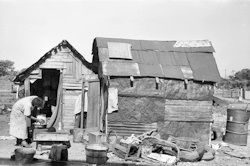 |
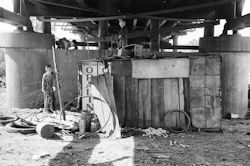 |
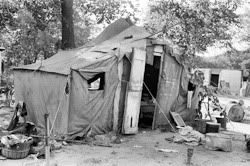 |
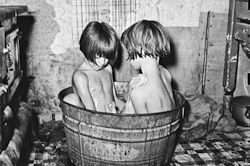 |
The April 26, 1938, Oklahoman article below paints a dismal picture of the city:
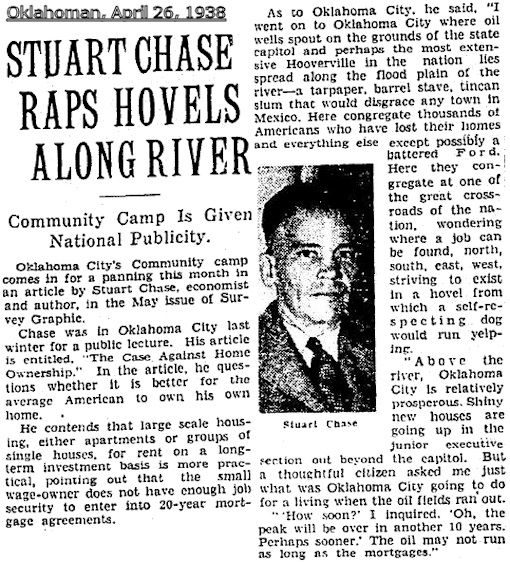
As to Oklahoma City, he
said, “I went on to Oklahoma City where oil wells spout on the grounds of the state capitol and perhaps the most extensive Hooverville in the nation lies spread along the flood plain of the river — a tarpaper, barrel stave, tincan slum that would disgrace any town in Mexico. Here congregate thousands of Americans who have lost their homes and everything else except possibly a battered Ford. Here they congregate at one of the great crossroads of the nation, wondering where a job can be found, north, south, east, west, striving to exist in a hovel from which a self-respecting dog would run yelping.”
By saying the above, I don’t mean to say that unbridled and unregulated corporate capitalism was the sole cause of the Great Depression or of Oklahoma’s share of it, and I’m not forgetting the Dust Bowl days of the 1930s contributed largely to Oklahoma’s woes during the 1930s-early 1940s. And I’m not ignoring that during the same period of time corporations did a lot of good for the economy.
Just the same, it would be difficult to argue that corporations did not contribute largely to the Great Depression itself. It would be even more difficult to argue, I would suppose, that corporations place national or local well-being in as high a priority as they do their own bottom line — profit. That’s natural and fair — but the plain fact is that corporate expenditures to political campaigns directly or as Super PACs indirectly are made for the same reason — their own profits. At least, that’s my opinion.
I’m probably not too far off base to speculate that laws which existed prior to the Citizens United decision were made for substantial reasons, and that those reasons were something along the lines of what I’ve discussed above.
Oklahoma Law. Oklahoma is one of many states which either prohibited or restricted corporate funds being spent on political elections. See this article at the National Conference of State Legislatures website. In Oklahoma, corporations are created under the authority of state or federal law which fact is universally true in the United States.
Oklahoma Constitution, Article 9, §40, provides that,
§40. Influencing elections or official duty.
No corporation organized or doing business in this State shall be permitted to influence elections or official duty by contributions of money or anything of value.
That constitutional provision has not been repealed and remains the constitutional law of our state. Even in the present Oklahoma era of what I will call extreme moral conservatism, in which the state Senate just approved a bill which, if enacted into law, would declare human life to begin at conception, corporate “personhood,” which could by analogy be seen to be the point of conception of a — incorporation of the corporation — was ignored.
… more to come …
